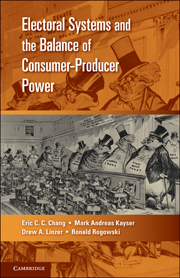Book contents
- Frontmatter
- Contents
- Acknowledgments
- 1 Introduction
- 2 Electoral Systems and Consumer Power: Theoretical Considerations
- 3 Electoral Systems and Real Prices: Panel Evidence for the OECD Countries, 1970–2000
- 4 Electoral Systems and Real Prices around the World
- 5 A Closer Look: Case Studies and Mechanisms
- 6 Socioeconomic Origins of Electoral Systems
- 7 Conclusion
- Bibliography
- Index
7 - Conclusion
Published online by Cambridge University Press: 05 June 2012
- Frontmatter
- Contents
- Acknowledgments
- 1 Introduction
- 2 Electoral Systems and Consumer Power: Theoretical Considerations
- 3 Electoral Systems and Real Prices: Panel Evidence for the OECD Countries, 1970–2000
- 4 Electoral Systems and Real Prices around the World
- 5 A Closer Look: Case Studies and Mechanisms
- 6 Socioeconomic Origins of Electoral Systems
- 7 Conclusion
- Bibliography
- Index
Summary
The fundamental claim of this book has been just this: that more responsive political systems – ones that shift the most power in response to the smallest changes in voter sentiment – empower consumers. The less the distribution of power responds to voter sentiment, the more powerful producers will be. And because producers readily conspire to inhibit competition, that power expresses itself in anticompetitive policies: barriers to entry, regulated prices, local or niche-market monopolies. Although we have focused on one (we believe) particularly compelling bit of evidence, namely the link between electoral systems and prices, our more basic point has many further implications, some of which we outline here as an agenda for further research.
If our basic point is right, electoral systems must be endogenous (as Acemoglu [2005] has argued, and as we have tried to show in Chapter 6): Neither voters nor politicians (let alone lobbyists) are fools, and they understand (if only intuitively) a great deal of what is at stake. Yet crucial political institutions are “sticky,” indeed often constitutionally anchored, and we will follow convention in positing in the first part of our discussion here that the electoral system is exogenous. So what, beyond higher prices, does a less responsive electoral system (in most cases, PR) entail? At a minimum, we argue, quite different modes of political action and organization, different fiscal systems, and consequently different policies.
- Type
- Chapter
- Information
- Electoral Systems and the Balance of Consumer-Producer Power , pp. 223 - 238Publisher: Cambridge University PressPrint publication year: 2010



